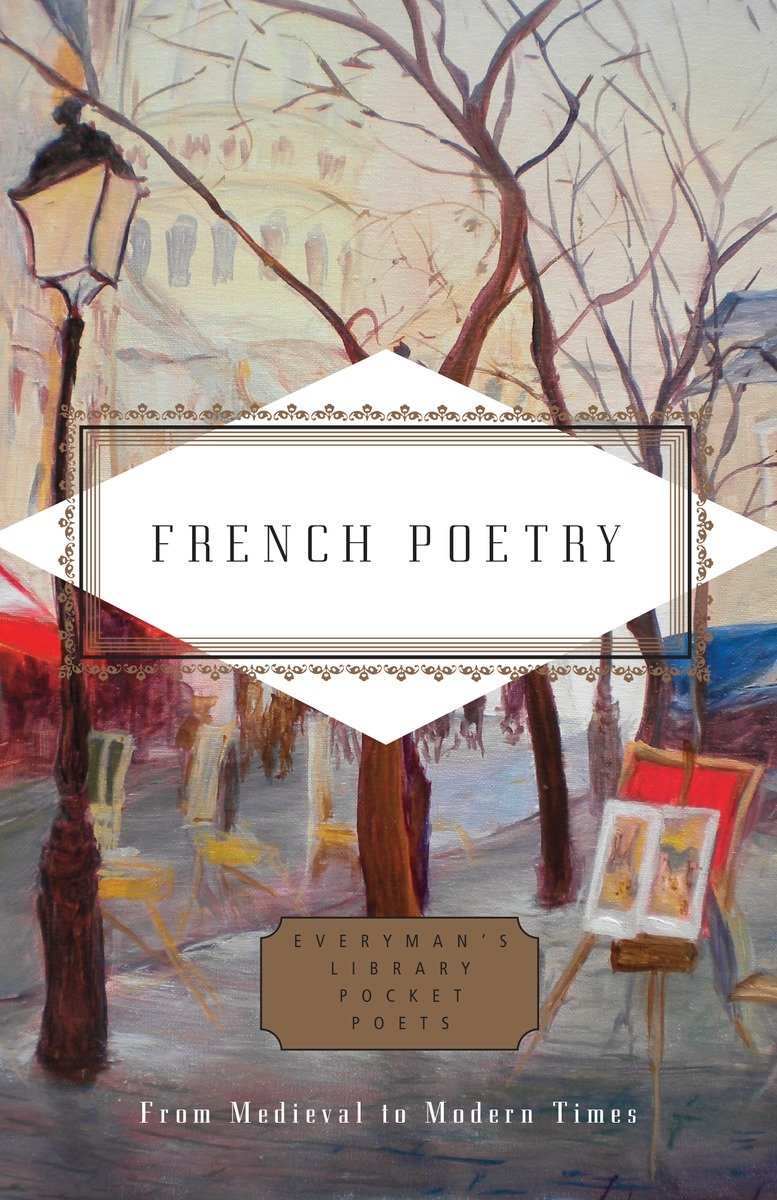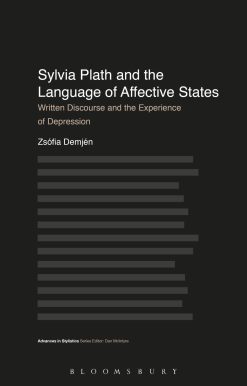French Poetry: From Medieval to Modern Times
| by |
|---|
14.00 JOD
Please allow 2 – 5 weeks for delivery of this item
Description
A beautifully jacketed hardcover collection of verse by French-speaking poets from cultures across the globe, spanning the ages from medieval to modern. EVERYMAN’S LIBRARY POCKET POETS. From the troubadours of the Middle Ages to the titans of modern poetry, from Rabelais and Ronsard to Aimé Césaire and Yves Bonnefoy, French Poetry offers English-speaking readers a one-volume introduction to a rich and varied tradition. Here are today’s rising stars mingling with the great writers of past centuries: La Fontaine, François Villon, Christine de Pizan, Marguerite de Navarre, Louise Labé, Baudelaire, Rimbaud, Verlaine, Mallarmé, Apollinaire, and many more. Here, too, are representatives of the modern francophone world, encompassing Lebanese, Tunisian, Senegalese, and Belgian poets, including such notable writers as Léopold Senghor, Vénus Khoury-Ghata, and Hédi Kaddour. Finally, this anthology showcases a wide range of the English language’s finest translators—including such renowned poet-translators as Ezra Pound, Marianne Moore, John Ashbery, and Derek Mahon—in a dazzling tribute to the splendors of French poetry.
Additional information
| Weight | 1.2 kg |
|---|---|
| Dimensions | 2.4 × 11.18 × 16.51 cm |
| PubliCanadation City/Country | USA |
| by | |
| Format | Hardback |
| Language | |
| Pages | 256 |
| Publisher | |
| Year Published | 2017-4-11 |
| Imprint | |
| ISBN 10 | 1101907835 |
| About The Author | PATRICK MCGUINNESS is a British academic, critic, novelist, and poet. He is Professor of French and Comparative Literature at the University of Oxford, where he is Fellow and Tutor at St. Anne's College. He was born in Tunisia to an Irish father and Belgian mother, and grew up in Belgium. |
| Table Of Content | CONTENTS Preface Marie de France (fl. 1160–1215)The Man and the Measuring Rod Christine de Pisan (c. 1364–c. 1431)Rondeau Louise Labe (1420/22–66)‘What good is it now, that you so perfectly’ ‘As long as my eyes still have tears to cry’ ‘I live, I die: I flare up & I drown’ Francois Villon (c. 1431–after 1463)Ballad for the Dead Ladies Marguerite de Navarre (1492–1549)‘My time grows short’ Francois Rabelais (c. 1494–1553)To the ReaderClement Marot (1496–1544)Rondeau of Antique LoveSong Maurice Sceve (c. 1501–c. 1564)From Delie:‘The Eye, too afire with my youthful errors’‘Rhone, & Saone shall sooner be disjoined’ ‘Some delight in tales well told’ ‘The less I see her, the more I hate her’ ‘Alone with myself, she with her husband’ ‘If you wonder why two elements’ Pernette du Guillet (c. 1520–45)From Epigrammes:‘If you wish not to prize so much thisring’‘No remedy I seek, in my defense’Joachim du Bellay (c. 1522–60)From The Regrets ‘O thou newcomer who seek’st Romein Rome’ ‘Happy, who like Ulysses’Pierre de Ronsard (1524–85)From Cassandra:‘Whoever wants to see how Love can tame’ ‘To think one thought hundreds, hundreds of times’‘Set free from reason and enslaved to passion’ ‘He who made this world, fashioned faithfully’ ‘Sweet Sleep, that brings to everything its peace’ Catherine des Roches (1542–87)Quenouille, mon soucy, je vous promets et jure Madeleine de l’Aubespine (1546–96)‘Let the earth cease its turning, suddenly’ Marie de Cleves (1553–74)Rondeau Jean de Sponde (1557–95)‘Imagine yourself in the heavens,floating high’ Jean-Baptiste Chassignet (1571–1635)‘Seat yourself on the edge of a wavy river’ Madeleine de Scudery (1607–1701)‘To tell the truth, Job’s destiny’ Jean de la Fontaine (1621–95)The Hen That Laid the Golden Eggs Antoinette des Houlieres (1638–94)ReflectionsAndre Chenier (1762–94)From Hymne, a la France Versailles ‘Comme un dernier rayon’ Marceline Desbordes-Valmore (1786–1859)Memory The Roses of Saadi Apart The Lost Secret Victor Hugo (1802–85)MoonlightNight on the Ocean ‘At dawn tomorrow, when the plains grow bright’ Louise Colet (1810–76)For My DaughterTheophile Gautier (1811–72)Farewell to Poetry ArtCharles Baudelaire (1821–67)To Each His Chimæra The Swan ‘More memories than the fossils of the ages’You’d Sleep with Anything La BeauteAnywhere out of the World Intoxicate Yourself Epilogue To the ReaderCorrespondences The Mercenary MuseLouise Michel (1830–1905)Oath Stephane Mallarme (1842–98)‘To insert myself into your plot’ The Tomb of Edgar Poe The Tomb of Charles BaudelaireA SighSea-Wind Jose-Maria De Heredia (1842–1905)The Nemean LionPaul Verlaine (1844–96)To Arthur Rimbaud NevermoreMy Recurring DreamAnguish Green Colloque sentimentale Spleen Tristan Corbiere (1845–75)The Toad Epitaph Arthur Rimbaud (1854–91)The Drunken Boat Evening Prayer Sonnet to an Asshole From Une Saison en EnferAfter the Deluge DepartureCity CharlevilleVoyellesOn the Road Jules LaForgue (1860–87)The Dirge of the Poet’s Fetus Legende Paul Valery (1871–1945)In the SunThe Marine Cemetery PoetryThe Steps Gerard D’Houville (1875–1963)Ashes Leon-Paul Fargue (1876–1947)A Fragrance of Night . . . Anna de Noailles (1876–1933)Offering to Pan Guillaume Apollinaire (1880–1918)‘Here’s the coffin’ ‘I dreamt I was going’The Mirabeau BridgeZone Photograph The Night of April 1915 Calligram, 15 May 1915 Valery Larbaud (1881–1957)The Old Station at Cahors Catherine Pozzi (1882–1934)Nyx Jules Supervielle (1884–1960)Rain & the Tyrants Blaise Cendrars (1887–1961)The Prose of the Trans-Siberian and of Little Jeanne of France Pierre-Jean Jouve (1887–1976)Lament for the Stag Paul Eluard (1895–1952)Lady LoveGiorgio de Chirico Andre Breton (1896–1966)Always for the First Pierre Reverdy (1889–1966)Heavier That . . . Is Ajar Live FleshTristan Tzara (1896–1963)Proclamation without Pretension Antonin Artaud (1896–1948)Post-ScriptumLouis Aragon (1897–1982)The Unoccupied Zone The Lilacs and the RosesFrancis Ponge (1899–1988)The End of Autumn The Mollusc Henri Michaux (1899–1984)Slices of Knowledge Benjamin Peret (1899–1959)Little Song of the Maimed Jacques Prevert (1900–77)Pater Noster Robert Denos (1900–45)Epitaph ‘I have dreamed of you so long’ Last PoemMarguerite Yourcenar (1903–87)Poem for a Doll Bought in a Russian BazaarJean Follain (1903–71)Metaphysics Absence Eugene Guillevic (1907–97)From Carnac Leopold Sedar Senghor (1906–2001)The Young Sun’s Greeting Patrice de la Tour du Pin (1911–75)First Concert on Earth (Borlonge) Aime Cesaire (1913–2008)song of the sea horse link of the chain gangAnne Hebert (1916–2000)Rain Yves Bonnefoy (1923–2016)Imperfection Is the Summit ‘O flame’ Heather Dohollau (1925–2013)Suite Philippe Jaccottet (1925–)The Voice Interior Venus Khoury-Ghata (1935–)She Used to Throw Her Old Crockery Henri Thomas (1913–93)End of His TetherPaul de Roux (1937–)Day by Day The Deep Street Jacques Reda (1929–)Prayer of a Passer-ByVertigoMichel Deguy (1930–)‘Someone has been and is no longer’Marie-Claire Bancquart (1932–)Return of UlyssesHedi Kaddour (1946–)Verlaine Guy Goffette (1947–)From A Speck of Gold in the Mud False Lelian Letter to the Unknown Woman acrossthe Street Gilles Ortlieb (1953–)‘Through the window, a small man in a tan scarf’ ‘Snow in Thionville’ Valerie Rouzeau (1967–)18 Lines towards What From Cold Spring in Winter |
| Excerpt From Book | PREFACE ‘For the best part of a thousand years English poets have gone to school to the French’, wrote Ezra Pound: ‘The history of English poetic glory is a history of successful steals from the French.’ Pound spoke many languages, and exaggeration was one of them, but his typically bold statement tells us something of the relationship between French- and English-language poetry from the age of Chaucer to the age of Pound and Eliot and beyond. Languages are not nations, and thanks to translation they have no borders. From the earliest days, when Chaucer was looking across the Channel for his motifs and his techniques, to the French Romantics and Symbolists of the nineteenth century and the Surrealists of the twentieth, France has given the world an anthology of models and inspirations. Louise Labe, du Bellay, Ronsard, Hugo, Verlaine, Rimbaud, Mallarme, Laforgue, Aragon, Eluard, and countless other French poets have changed not just their own national traditions but those of other cultures. This anthology presents a selection of French poems over nine centuries, starting with Marie de France and finishing with Valerie Rouzeau. Along the way it introduces the reader to a range of forms, from the ballad and sonnet, by way of the prose poem and free verse, to the experimental techniques of the twentieth and twenty-first centuries. It gives due prominence, too, to women poets and to writers from what is known as ‘francophonie’: French-language cultures which, whether through colonization or more benign forms of cultural affiliation, express themselves in the language of Racine and Baudelaire. But they also change that language, extending and enriching it, as we see in the work, notably, of Aime Cesaire and Leopold Sedar Senghor, poets who were also politicians and who played important roles in their countries’ post-colonial history. While the poets tell their own story, the translators too are representative of their art. There are many kinds of translation: the faithful translation (but faithful to what? faithful to whom?), the free translation (free from what? according to what rules?), the version, the adaptation, and the translation so removed from its original that we think it may as well declare itself a poem and have done with it. I have included translations by poets such as Marianne Moore, John Ashbery, Marilyn Hacker, Beverley Bie Brahic and Pound himself, but also translators, such as Richard Sieburth, Martin Sorrell, Mary Ann Caws and Norman Shapiro, whose work over the years has done much to keep open the lines of communication between today’s English-language reader and the poets of the past. There are occasional surprising meetings, such as F. Scott Fitzgerald’s version of Rimbaud’s ‘Voyelles’, Wallace Stevens’s Le´on-Paul Fargue, or G. K. Chesterton’s du Bellay, which remind us that, for some, translation is a lifetime’s travel, and for others a unique, one-off foray into a foreign land. To say there are love poems, both requited and unrequited, poems about life and death, war, triumph and defeat, is not to make a statement either about French poetry or about its Frenchness. But French poetry is among the most influential in the Western world because it has been so responsive and so curious about the literatures of others. Since the medieval period, French poets have been great cosmopolitans, and the import-export of translation has ensured that they themselves ‘borrowed’ as much as they lent to others. French renaissance poets read the classics, but also looked to far-off countries for their inspiration, while the nineteenth-century Romantics looked across to England or to Germany and Spain. America and American literature (not just Britain and British) have always been part of this exchange, and the French have always had a special affinity with America and its literature. After all, Baudelaire claimed to have learned English to translate Poe, while the Symbolists of the 1880s and 1890s read and translated Whitman, using him to justify their own experiments with ‘free verse’. Poetry is an international language, but we rely on translation to make it so. –Patrick McGuinness |
| Series |
Only logged in customers who have purchased this product may leave a review.
Related products
-
On backorder 2-5 Weeks to Arrive
36.99 JOD -
Low stock
7.99 JOD -
On backorder 2-5 Weeks to Arrive
10.99 JOD -
On backorder 2-5 Weeks to Arrive






Reviews
There are no reviews yet.